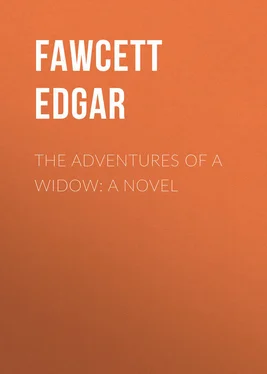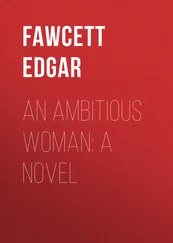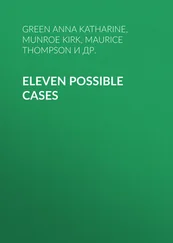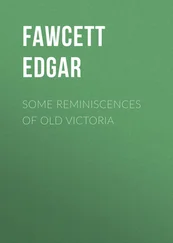Edgar Fawcett - The Adventures of a Widow - A Novel
Здесь есть возможность читать онлайн «Edgar Fawcett - The Adventures of a Widow - A Novel» — ознакомительный отрывок электронной книги совершенно бесплатно, а после прочтения отрывка купить полную версию. В некоторых случаях можно слушать аудио, скачать через торрент в формате fb2 и присутствует краткое содержание. Жанр: foreign_antique, foreign_prose, на английском языке. Описание произведения, (предисловие) а так же отзывы посетителей доступны на портале библиотеки ЛибКат.
- Название:The Adventures of a Widow: A Novel
- Автор:
- Жанр:
- Год:неизвестен
- ISBN:нет данных
- Рейтинг книги:4 / 5. Голосов: 1
-
Избранное:Добавить в избранное
- Отзывы:
-
Ваша оценка:
- 80
- 1
- 2
- 3
- 4
- 5
The Adventures of a Widow: A Novel: краткое содержание, описание и аннотация
Предлагаем к чтению аннотацию, описание, краткое содержание или предисловие (зависит от того, что написал сам автор книги «The Adventures of a Widow: A Novel»). Если вы не нашли необходимую информацию о книге — напишите в комментариях, мы постараемся отыскать её.
The Adventures of a Widow: A Novel — читать онлайн ознакомительный отрывок
Ниже представлен текст книги, разбитый по страницам. Система сохранения места последней прочитанной страницы, позволяет с удобством читать онлайн бесплатно книгу «The Adventures of a Widow: A Novel», без необходимости каждый раз заново искать на чём Вы остановились. Поставьте закладку, и сможете в любой момент перейти на страницу, на которой закончили чтение.
Интервал:
Закладка:
He laughed his blithe, bass laugh. "Oh," he said, "I know a lot of things in a loose, haphazard way. We newspaper men can't escape general information, Mrs. Varick. We breathe it in, naturally, and in spite of ourselves."
"But tell me," Pauline now asked, "are these other people to whom I shall soon be presented as clever as you are?"
He looked at her with merriment twinkling in his light-tinted eyes. "They're a good deal cleverer – some of them," he replied. "They could give me points and beat me, as we say in billiards."
"You make me very anxious to know them."
"When you talk like that I feel as if I might be tempted to postpone all introductions indefinitely," he responded. He spoke with sudden seriousness, and she felt that mere gallantry had not lain at the root of this answer.
As a matter of course, Kindelon and Courtlandt soon met each other in Pauline's drawing-room. Courtlandt was quite as quiet as usual, and the Irishman perhaps rather unwontedly voluble. Pauline thought she had never heard her new friend talk better. He made his departure before her cousin, and when he had gone Pauline said, with candid enthusiasm:
"Isn't he a wonderful man?"
"Wonderful?" repeated Courtlandt, a trifle drowsily.
She gave him a keen look, and bristled visibly while she did so. "Certainly!" she declared. "No other word just expresses him. I didn't observe you very closely, Court," she went on, "but I took it for granted that you were being highly interested. I can't imagine your not being."
"He gave me a kind of singing in the ears," said Courtlandt. "I've got it yet. He makes me think of one of those factories where there's a violent hubbub all the time, so that you have to speak loud if you want to be heard."
Pauline was up in arms, then. "I never listened to a more scandalously unjust criticism!" she exclaimed. "Do you mean to tell me, unblushingly, that you do not think him a very extraordinary person?"
"Oh, very," said her cousin.
Pauline gave an exasperated sigh. "I am so used to you," she said, "that I should never even be surprised by you. But you need not pretend that you can have any except one truthful opinion about Mr. Kindelon."
"I haven't," was the reply. "He's what they call a smart newspaper man. A Bohemian chap, you know. They're nearly all of them just like that. They can talk you deaf, dumb, and blind, if you only give them a chance."
"I don't think the dumbness required any great effort, as far as you were concerned!" declared Pauline, with sarcastic belligerence.
She never really quarrelled with Courtlandt, because his impregnable stolidity made such a result next to impossible. But she was now so annoyed by her cousin's slighting comments upon Kindelon that her treatment was touched with a decided coolness for days afterward.
Meanwhile her aunt, Mrs. Poughkeepsie, had undergone considerable discomforting surprise. Mrs. Poughkeepsie had been prepared to find Pauline changed, but by no means changed in her present way. On hearing her niece express certain very downright opinions with regard to the life which she was bent upon hereafter living, this lady at first revealed amazement and afterward positive alarm.
"But my dear Pauline," she said, "you cannot possibly mean that you intend to get yourself talked about?"
"Talked about, Aunt Cynthia? I don't quite catch your drift, really."
"Let me be plainer, then. If you remain out of society, that is one thing. I scarcely went anywhere, as you know, for ten years after my husband's death – not, indeed, until Sallie had grown up and was ready to come out. There is no objection, surely, against closing one's doors upon the world, provided one desires to do so – although I should say that such a step, Pauline, at your age, and after two full years of widowhood, was decidedly a mistake. Still" —
"Pardon me, Aunt Cynthia," Pauline here broke in. "Nothing is further from my wish than to close my doors upon the world. On the contrary, I want to open them very wide indeed."
Mrs. Poughkeepsie lifted in shocked manner both her fair, plump, dimpled hands. She was a stout lady, with that imposing, dowager-like effect of embonpoint which accompanies a naturally tall and majestic stature. Her type had never in girlhood been a very feminine one, and it now bordered upon masculinity. Her eyes were hard, calm and dark; her arching nose expressed the most serene self-reliance. She was indeed a person with no doubts; she had, in her way, settled the universe. All her creeds were crystallized, and each, metaphorically, was kept in cotton, as though it were a sort of family diamond. She had been a Miss Schenectady, of the elder, wealthy and more conspicuous branch; it was a most notable thing to have been such a Miss Schenectady. She had married a millionaire, and also a Poughkeepsie; this, moreover, was something very important and fine. She had so distinct a "position" that her remaining out of active participation in social pursuits made no difference whatever as regarded her right to appear and rule whenever she so chose; it had only been necessary for her to lift her spear, when Miss Sallie required her chaperonage, and the Snowes and Briggses had perforce to tremble. And this fact, too, she held as a precious, delectable prerogative.
In not a few other respects she was satisfied regarding herself. There was nothing, for that matter, which concerned herself in any real way, about which she did not feel wholly satisfied. Her environment in her own opinion was of the best, and doubtless in the opinion of a good many of her adherents also. From the necklace of ancestral brilliants which she now wore, sparkling at ball or dinner, on her generous and creamy neck, to the comfortably-cushioned pew in Grace Church, where two good generations of Poughkeepsies had devoutly sat through many years of Sundays, she silently valued and eulogized the gifts which fate had bestowed upon her.
Pauline's present attitude seemed to her something monstrous. It had not seemed monstrous that her niece should give the bloom and vital purity of a sweet maidenhood to a man weighted with years and almost decrepid from past excesses. But that she should seek any other circle of acquaintance except one sanctioned by the immitigable laws of caste, struck her as a bewildering misdemeanor.
"My dear Pauline," she now exclaimed, "you fill me with a positive fear! Of course, if you shut your doors to the right people you open them to the wrong ones. You have got some strange idea abroad, which you are now determined to carry out – to exploiter , my dear! With your very large income there is hardly any dreadful imprudence which you may not commit. There is no use in telling me that the people whom one knows are not worth knowing. If you have got into that curious vein of thought you have no remedy for it except to refrain from all entertaining and all acceptance of courtesies. But I beg, Pauline, that you will hesitate before you store up for yourself the material of ugly future repentance. Sallie and I have accepted the Effinghams' box at the opera to-night. Those poor Effinghams have been stricken by the death of their father; it was so sudden – he was sitting in his library and literally fell dead – he must certainly have left two millions, but of course that has nothing to do with their bereavement, and it was so kind of them to remember us. They know that I have always wanted a proscenium, and that there are no prosceniums, now, to be had for love or money. I have sent our box in the horse-shoe to cousin Kate Ten Eyck; she is so wretchedly cramped in her purse, you know, and still has Lulu on her hands, and will be so grateful – as indeed she wrote me quite gushingly that she was , this very afternoon. Now, Pauline, won't you go with us, my dear?"
Читать дальшеИнтервал:
Закладка:
Похожие книги на «The Adventures of a Widow: A Novel»
Представляем Вашему вниманию похожие книги на «The Adventures of a Widow: A Novel» списком для выбора. Мы отобрали схожую по названию и смыслу литературу в надежде предоставить читателям больше вариантов отыскать новые, интересные, ещё непрочитанные произведения.
Обсуждение, отзывы о книге «The Adventures of a Widow: A Novel» и просто собственные мнения читателей. Оставьте ваши комментарии, напишите, что Вы думаете о произведении, его смысле или главных героях. Укажите что конкретно понравилось, а что нет, и почему Вы так считаете.












